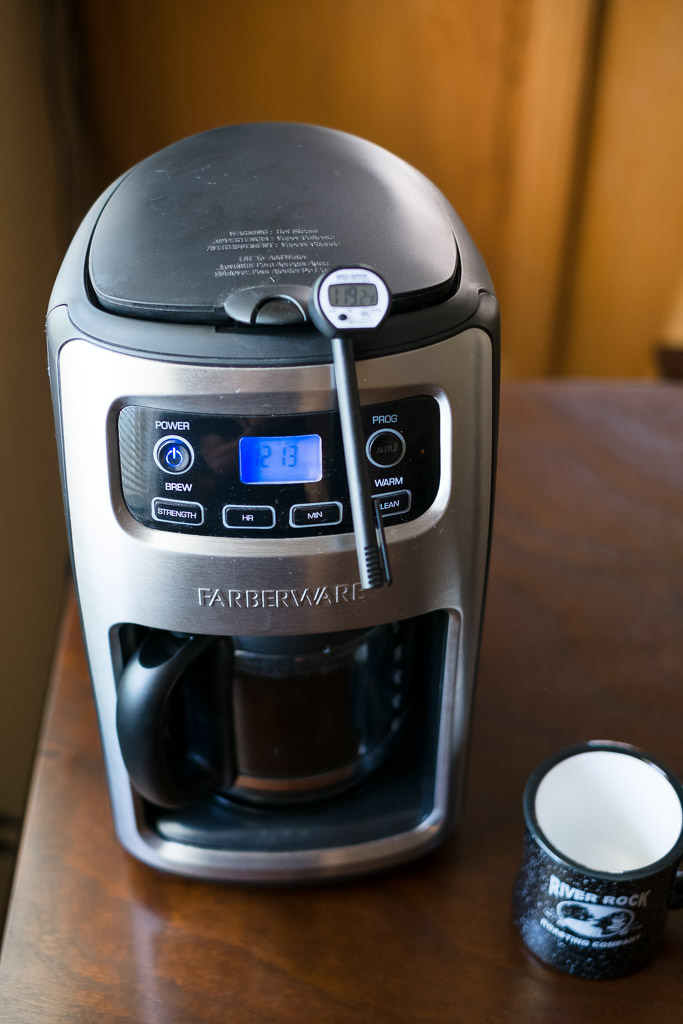Good Coffee, Normal Coffee Maker, Part 1 - Temperature
"Can you make a good pot of coffee in a regular coffee maker?" In preparation for launching this blog, I asked for input on questions people had about coffee. This question hit the top of the list as one of the most frequently asked questions. It makes sense. While I may find satisfaction in making each cup of coffee individually, others simply want good coffee without having to devote 20 minutes of their morning to the process. So, in an effort to make good coffee more accessible, I borrowed a friend's coffee maker to see what we could get out of it. Over the next couple of posts, I'll cover the various experiments I ran and what I found out so you can up your coffee game with the same maker.
Determining Factors to Quality
To determine whether or not the coffee maker had the capability of producing good coffee we need to evaluate a couple of key factors. Temperature of the water, brew time, and ratio accuracy all contribute heavily to the extraction process. The results of these tests will likely vary between brands and coffee makers, so you may need to dial in the adjustments for your specific coffee maker. If you have a coffee maker and you choose to figure this all out for you brand, I'd love to hear what you found so I can share it with others!
Coffee Maker Temperature
As we've covered previously, coffee is essentially a solution of particles from ground coffee beans dissolved in water. Coffee's ideal solubility, its ability to dissolve in water, occurs between 195°F and 205°F. If water passes through the grounds below those temperatures, the solvents will dissolve incompletely. Many of the solvents won't make it out of the grounds and into the water resulting in a flat, underdeveloped cup of coffee. So first, we need to determine what temperature does the coffee maker brew at under normal circumstances.
The Test
For this test, I placed a thermometer into the grounds basket below the dispersion head. I used 85°F tap water and ran the coffeemaker with a filter in place, but no coffee grounds. The readings follow:
- First batch of water through the dispersion head measured at 119°F
- 4 minutes into brewing, temperatures peaked at 178°F
- 5 minutes, 194°F
- 6 minutes, 196°F
- 7 minutes, temperatures reach 203°F maintain +/- 2 degrees for the remainder of the 15 minute brew cycle
From test 1, I observed that the brewer prioritizes brew time over brew temperature. The water didn't reach the optimal temperature until almost halfway through the brew cycle. The next couple of tests repeated this pattern within 5° at each time interval, reaching optimal temperatures around the 6-7 minute marks.
Adjustment
In light of the observations from test 1, I decided to use the already heated water from the most recent brew cycle. It measured at 174°F in the reservoir. The adjustment created satisfactory results: the first batch of water recorded at 200°F and maintained a temperature of 20 +/- 2 degrees for the duration of the brew cycle. Subsequent tests confirmed these results.
Conclusion
To ensure proper water temperature for optimal solubility, pre-heat the water to at least 170° in the reservoir before brewing. You can either bring water to boil in the stove or in a microwave or simply run water through the coffee maker then add it back into the reservoir. This does pose a bit of a problem for delay timed brews set up the night before, but I am confident you'll notice an improvement in coffee quality.
If you give this adjustment a try with your home coffee maker, let me know what you think! Did you notice a difference in your coffee? If you ran these tests with your coffee maker and had different results, I'd love to hear that as well!
As always, if you have any comments, questions, or ideas for future posts you can drop a comment below, contact me via email, or connect over social media!
Stay handsome


